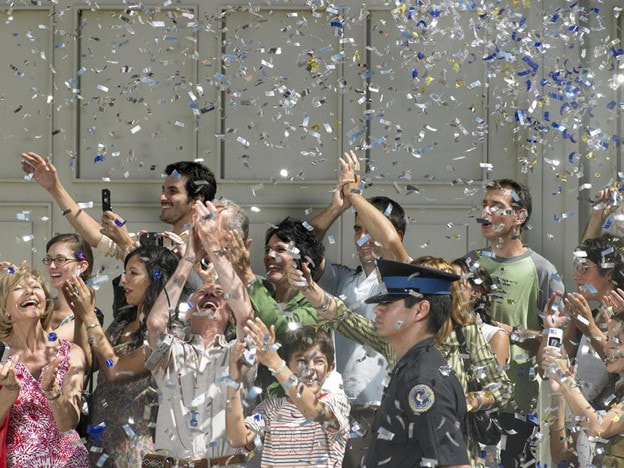|
Playing in a piano recital is a bit like the expression “let the chips fall where they may.” Meaning that you can’t control what happens in a performance, unlike practicing at home.
One example I use to illustrate this difference to my students is by asking them, “What’s the difference between watching a DVD and going to the movie theatre?” [Next time you go to the movies, try raising your hand and asking them to pause the film while you use the bathroom xP]
But I never liked the idea of crossing your fingers and hoping for the best. Although you can’t completely control how the performance will unfold, there are things you can do to prepare your piano students to play their potential. The most important thing to keep in mind is the objective and goal for each individual student. As a teacher, find out what you want each of your students to achieve and reverse-engineer it. Objectives and goals must be custom-tailored to where each student is at in their musical journey and development. For example, consider a first-time performer. For these newbies, we want to set expectations and standards as low as possible. However, this isn’t an excuse for them to tank their performance; it’s to make their experience as pressure-free and enjoyable as possible. The goals at this level are simply to have fun and make it to the end of their performance. For my more experienced students we raise the standards. When recitals feel “normal” for them, we can begin focusing on more challenging objectives. We talk about how their last performance went and I provide my own feedback as to what went well and what needs improvement. We focus on stage presence and communicating confidence with posture. On the stage, their goals are to play through their mistakes as seamlessly as possible, keeping a steady rhythm no matter what happens and allowing their expressiveness (dynamics, ideas, phrasing) to come out. Piano Recital Preparation
The proper mindset for a recital is that it’s not a competition. It’s an event to share your progress or test out new ideas. If anything, you’re competing against yourself.
The audience and fellow students are there to support you. It’s amazing to me that sometimes a student will be shocked when I say that everyone is rooting for you, that they actually want you to do well. With every student there are practical activities they can participate in to bring out their best performance, or at least their best effort. Keep in mind, though, that the end goal for all students should still be to enjoy themselves in the moment as much as possible. I also want them to look at each performance as a learning experience. It’s not about getting all the “right notes” or “not making mistakes.”
A successful performance has nothing to do with accuracy. In fact, what the professionals do better is not playing “perfectly”; it’s the way they react or respond to mistakes or memory slips that makes them different.
Focusing on getting the “right notes” or “not making mistakes” will get you more mistakes. [As an exercise, try not to think of the color BLUE] You (also) get what you don’t want. For our recent piano recital I had many students, if not all, “rehearse” at their lessons. This entailed literally sitting at their chair, walking to the piano, playing, and bowing after finishing. At the same time I would ask questions such as: What is your cue to play? When are you supposed to bow? How many times do you bow? Why do you bow? Where do you go after you finish playing? The point of these questions is not to make them think more, it’s to help get them out of their heads. Seems like a paradox, right? Well let me tell you, on recital day these kids are unbelievably nervous (especially if it’s their first time). This little event is a big deal for them. So it goes without saying that I want them to feel as comfortable as possible. Confidence will come in the knowledge that they know what to do every step of the way. Instead of freaking out, they’re waiting for their cue. Instead of shaking in their boots, they’re reminding themselves of when they’re supposed to bow. Taking the focus off of yourself is a lot like volunteering. One of the reasons people enjoy volunteering so much is that it puts their attention onto something more worthwhile. In much the same way my hope is that the students will take their focus off of how nervous or scared they feel and onto the experience and audience in front of them. It’s awareness. As a side note, many students’ stage fright comes from lack of experience, not enough preparation, or even a traumatic childhood event. Lack of experience or getting past a trauma is not an immediate fix, but preparation is something we can do right away. One huge mistake is trying to cram right before a recital. Many teachers start way too late to prepare for a recital, performance, or piano exam. Their motto is start slow, finish fast. But the proper execution is to start fast and finish slow. What I mean is intensely practicing as if the recital is next week when in fact it’s 3 months away. Set buffer deadlines [mini-deadlines] instead of one big deadline. It’s like giving yourself a few safety nets instead of just one. Then as the recital approaches they can adjust and have a more relaxed strategy or continue to practice as hard as they want, all the while taking solace in the fact that they are extremely well prepared. A great method to gauge a student’s preparation is to ask the following question: Is this the best you can play at this very moment? If they say yes, they’re ready! No means more practice. This is a great question because it allows the students to intuitively tell if they’re good to go. It permits them be honest with themselves and when they can be self-honest, it makes for a powerful incentive to practice more. I’ve found that when students are lagging behind their practice, this question jolts them out of their seats. It’s like a button gets switched on for them and they practice without me prodding them. And even if they don’t make it in time, it’s still a learning experience. Whatever the result, it’s good for them to know that they could have come better prepared. It’s a spark I hope will motivate them for the next time around. The last thing I would say is to help each student believe in themselves. I had an incident with a student where his preparation was not going well. My gut reaction was to be critical, wondering if he wasn’t practicing because he was being lazy or undisciplined. It was an eye-opener when I realized he simply didn’t believe he was capable of playing well. He didn’t think that piano was something he could be good at. Luckily, we found out in time to have a great turn-around. Remember what Seneca said, “Luck is what happens when preparation meets opportunity.” So when opportunity comes knocking, you can be sure I want my kids to be prepared to create their own luck. Happy practicing.
Did you enjoy reading this today?
More from Rhapsody Piano Studio…..
Your donation helps me create free content. Every dollar goes a long way! =)
0 Comments
Leave a Reply. |
Categories
All
|





